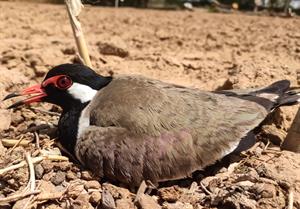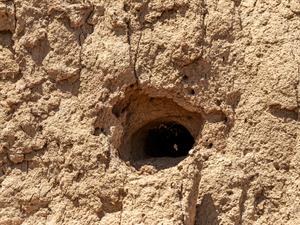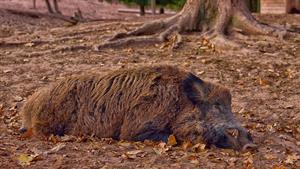PDF chapter test TRY NOW
SECTION - I
“A hole?” you may ask. “What could be interesting about a hole in the ground?” Well, this hole grew to be quite important, as you will discover.
For some time the hole remained dusty and untenanted, until one day a passing wild boar settled his rump into the depression. The pit was not comfortable enough and getting up, he scraped and dug, carving a pit of more hospitable proportions. Backing into this hollow, he turned around a few times and with a satisfied grunt settled down to a long snooze. A very long snooze it was too. The boar turned and scrabbled in his sleep, loosening the earth around his cosy dugout until the fading sun and the rumble in his stomach told him it was time to get up. With a mighty stretch and a final kick, the hungry boar departed his daybed without a backward glance.
“And is that it?” you will enquire. To which I will reply, “No it isn’t, dear one. Not by a long shot. Our story has just begun.”
Explanation:
There was a small bird in the outer parts of a small dusty village. She was looking for some tree or bushes to lay her eggs. But the ground was extremely dry due to the heat and not a single bush was found. The bird did not have a choice; it finally found a hole of small depth and started clearing the stones to make the hole bigger. She reduced the firmness of the ground by using her claws and laid her eggs in the spot, in the scorching heat.

The bird laid her eggs in the hole!
The eggs opened up and the mother bird safeguarded the baby birds. She fed the tiny ones until they grew into bigger birds. Then the birds flew away. That would have been the end of the story if it was about the bird. But interestingly, the story is about the "hole" that was used as a short-term nest!
One may wonder what could be so interesting about a hole in the ground. The hole gained more importance than just holding the bird's eggs for a temporary period. Read on to know more...

The hole which served as a temporary nest!
The hole remained empty and dusty for some days; no one occupied it. One day a wild boar (an animal resembling a pig) passed by the hole and decided to settle in the hole. It placed the backside of its body into the hole. The hole was small for the boar and therefore it was uncomfortable. He got up and started digging the ground of more comfortable size to place its body. He made the hole into a pit and rolled around to make sure he had enough space. He made a harsh noise to express his satisfaction. He decided to take a nap for a short time, but he slept for quite a long time.

The wild boar took a long snooze in his dugout!
Every time he moved his hands and legs in his sleep, the ground loosened up a bit. Finally, it was time for sunset, when his stomach started making deep sounds, indicating that he was hungry. So he stretched up himself and got up with a kick and left the hole without looking back once.
So does the story of the hole end here? The author says that it had just started!
Meanings of difficult words:
No. | Words | Meanings |
1 | outskirts | the outer parts of a village, town or city |
2 | parched | extremely dry due to excessive heat |
3 | desperation | a state of despair, hopelessness |
4 | depression | part of a surface that is slightly lower than the rest, like a hole |
5 | untenanted | not occupied |
6 | rump | the back part of the body of a mammal or the part used to sit down |
7 | hospitable proportions | accommodating size |
8 | grunt | (of an animal, especially a pig) make a low, short throaty sound |
9 | snooze | have a short, light sleep, especially during the day |
10 | scrabbled | moved hands and feet around |
11 | cosy | comfortable |
12 | dugout | a shelter dug in the ground |
13 | rumble | make a continuous deep sound |
Reference:
State Council of Educational Research and Training (2019). Term-3 English Standard-6. Who Owns the Water (pp 71-80). Published by the Tamil Nadu Textbook and Educational Services Corporation.
